Over the past three months, the Emerging Voices Initiative (EVI) conducted a cross-country listening tour, endeavouring to gauge the mood of Mennonite Church Canada congregants on what should happen next with the national church following the presentation of the Future Directions Task Force recommendations at last summer’s assembly in Saskatoon and the creation of a transition process to redefine the area and national churches. Each of the events asked participants of all ages three questions:
- What’s an initiative that you would like to see emerge?
- What do we have to let go of to make room for new growth?
- What do you want the leaders of MC Canada to know?
According to EVI member Jonas Cornelsen, the group of young adults intends to eventually “publish a report that highlights common themes across regions, and differences between regions.” In the meantime, Canadian Mennonite presents a roundup of each of the meetings:
Toronto and Waterloo, Ont., Nov. 10 and 11, 2016, respectively
By Dave Rogalsky
Eastern Canada Correspondent
In Toronto, the four EVI leaders each told the gathered group a bit of why they were so passionate about MC Canada. Katrina Woelk of Emmanuel Mennonite Church in Winkler, Man., shared that, coming from a small city in a predominantly rural area, she is interested in the integration of urban and rural Mennonites across the country. Laura Carr-Pries of St. Jacobs Mennonite, Ont., talked about how important it is to her to highlight that peace and justice is at the centre of worship and work, and that people are drawn to churches through focussing on action and thought together. Anneli Loepp Thiessen of the Gathering Church in Kitchener, Ont., sees an organization like MennoMedia connecting Mennonites not only across Canada, but across North America, and wants to see this work supported by a strong Canadian presence. Madeline Wichert of Toronto United Mennonite Church said that culture is “deeply felt” by all demographics in the church and is understood as a shared story. She wonders how “we create and share a story with young adults and newcomers” and how they “can taste a church’s culture.”
At both meetings, each attended by more than 50 people (mostly church leaders and pastors), many offered suggestions for listening more to each other’s program changes, and expressed heartfelt concerns that the Being A Faithful Church 7 resolution that created space for churches to support people in same-sex relationships, while good, meant that some congregations would continue to be unwelcoming to the LGBTQ community in the church, and questioned what the future of MC Canada could hold.
Leamington, Ont., Nov. 12, 2016
By Ruth Boehm
Special to Canadian Mennonite
It was a chilly evening when 18 people met at UMEI; almost half were leaders from EVI, MC Canada and Mennonite Church Eastern Canada. The rest were pastors and invested congregational leaders. Excitement was evident at the presence of the young adults giving clear leadership. Sadness was expressed that more people were not there. Gratitude abounded for the inclusion of this geographical area in the round of conversations.
Two questions sparked conversation. The first was pointed: Where is the power? Since the organized church seems to have power primarily in matters of leadership credentialling and ordination, what really binds people together when they are part of a voluntary organization?
The conversation about power included comments about the role of authority providing safety and, at the same time, calling people to set direction together. This was a fascinating discussion, given that one person identified that perhaps one of the reasons more people were not at the meeting may have to do with the history of the bishop system. The person suggested that there was a lingering subculture in one congregation resulting from 40 years ago, when the bishop would tell people what to think and believe. The impact was that some people were still finding it hard to ask questions.
A second question was raised about relationships between people: How can churches better foster relationships with one another across the country at grassroots levels and person to person? The significant role that church schools are playing in this conversation was noted.
Saskatoon, Nov. 26, 2016
By Donna Schulz
Saskatchewan Correspondent
A tentative hopefulness characterized many of the views expressed during two workshops hosted by members of EVI in Saskatoon.
Just over 50 members of Mennonite Church Saskatchewan congregations met at First Mennonite Church following the area church’s annual leadership assembly. The dreams participants shared varied, although they included some common threads.
John Bartel of North Star Mennonite in Drake said his discussion group dreams of a church that is “inclusive and attractive,” both to minorities and to new generations of believers.
Jacquelyn Janzen of Grace Mennonite in Prince Albert said her group hopes for the church “to find ways to engage youth and to be relevant.”
Craig Neufeld of Rosthern Mennonite noted that his group dreams of a church that “impacts the community and invites us to follow Jesus.”
Dave Feick of Osler Mennonite said that he and his group “want to be known for [their] love.”
Several groups expressed a desire for congregations and area churches to remain in contact with one another, with congregations that have left the denominational body, and with believers in the global church.
A similar but smaller gathering geared toward young adults took place later that day at the Mennonite Central Committee Saskatchewan offices. There, participants dreamed of a church that would value faith over culture. They also imagined a church in which people would be respectful and accepting of one another regardless of viewpoints.
Most groups seemed reluctant to name specific programs or structures they would let go of in order to foster new growth. They preferred, instead, to identify attitudes in need of changing. Several identified a need to let go of pride and a “sense of entitlement.” Others articulated a need to let go of fear, both of failure and of change.
The young adults also expressed frustration with the pace of change.
“I’ve run out of patience for the transition process,” said Krista Loewen of Wildwood Mennonite. “Let’s just get something going.”
Graham MacDonald, also of Wildwood, shared Loewen’s impatience but added, “Yeah, let’s let it go, but we have to have something worthy to replace it with.”
Cara Epp of Rosthern Mennonite countered the others’ impatience. “I think we need to be really cautious and understanding of others,” she said.
Some fearfulness emerged from the adult session in response to the third question.
Melanie Harms of Warman Mennonite said her group would like to tell leaders, “Sometimes we feel we don’t fully understand” the changes that are coming, and that “we are losing our national identity.” Members want church leaders to “ensure that we don’t get lost in the shuffle.”
By contrast, at the young adult gathering several participants used a forest fire metaphor to describe their hopefulness for new growth emerging from destruction.
“I’m going into this process with some confidence that we’re doing a good thing,” said David Epp, of Wildwood Mennonite in Saskatoon.
MacDonald agreed, saying, “I’m relieved that I don’t have to make the decisions, but I do have faith in those who are making them.”
Winnipeg, Nov. 27, 2016
By Beth Downey Sawatzky
Manitoba Correspondent
Key themes of the EVI Winnipeg visit—that involved 50 people from seniors to post-secondary students—included longing for vision and healthy debate in the national church, unity on a global scale, and continued intimacy on the local/regional scales. And guests with connections in youth groups and Sunday school classes also spoke out on behalf of these youngest members, voicing their needs and concerns.
One prominent concern raised by the Winnipeg crowd was for the church’s quality of internal debate on current hot-button issues such as LGBTQ inclusion and the restructuring of regional church governance/representation. Part and parcel with this came calls to relinquish fear throughout the evening, as participants exhorted one another and the national church to cling to Jesus Christ as the church’s identity and its strong defining centre, and to surrender themselves to process, mystery and change without fear.
“We need to let go of egos,” observed group-rep Raya Cornelsen, “and the notion that it takes a certain amount of money to do what we need to do as the church. We need to move beyond moneyed mentality.”
With a voice full of eagerness and hope, but also a note of strain, Dori Zerbe Cornelsen of Hope Mennonite Church encapsulated the mood of the evening when she asked the EVI team during question period to pass on Winnipeg’s love and affection when they continued westward. “When you visit the church in Alberta and B.C. after this, please tell all of them there from us that we love them. We love them, and we want to stay connected to them,” she said.
Edmonton, Dec. 3, 2016
By Donita Wiebe-Neufeld
Alberta Correspondent
Anneli Loepp Thiessen of EVI began by encouraging table groups to “be specific in your descriptions and tangible in your suggestions,” as more than 40 Edmonton participants at First Mennonite Church engaged questions surrounding the future ministry and organization of MC Canada.
Some main themes presented during an open-mic session dealt with a desire to maintain a common Anabaptist identity, a deep longing for connectedness with a national body that includes a variety of cultures and differing ideas, and recognition that church schools and missions require broad support.
Particular challenges named by the group included the need for MC Canada to rebuild trust in national leaders and the process of transition, and to articulate the relevance of the church to Canadian culture. It was noted that, as a small area church, Alberta feels particularly vulnerable if a national body is unable to undergird and support it.
Jan Wilhelm said, “ I want to see a national church that helps maintain identity and supports congregations. Pastor support [from a national body] helps maintain this.”
A few dreams, including a new structure that is more about relationships and worship than issues or business, a desire to more than symbolically empower the passion and vision of young leaders like those with EVI, and unity within diversity, surfaced repeatedly throughout the evening discussions.
It was noted by a number of participants that, while the church shares a vision of a diverse and united structure, it is notable that the transition team consists primarily of white, mostly middle-aged and older men, making it a strange contrast to the EVI discussion team that was made up of four young adult women.
Heather Bergen asked, “How do we move the transition of power? How do we let them make the decisions? If we don’t like their decisions, how do we go with them anyway?”
Abbotsford, B.C, Dec. 4, 2016
By Amy Dueckman
B.C. Correspondent
Using song, prayer, narrative and small group discussion, an enthusiastic group of young adults on the EVI workshop tour met with members of Mennonite Church B.C. at Columbia Bible College. About two dozen interested area church members came to hear what EVI had to say about the changes happening in MC Canada as a result of the Future Directions Task Force decision at Assembly 2016, and to share their own opinions.
The five young adults, all students at Canadian Mennonite University in Winnipeg, explained how the idea for their listening tour had come about, resulting in the “crazy” idea to cross Canada and meet with people in the various area churches.
An intergenerational church is important, they acknowledged, with younger people able to sound their voices. “We’re all the church now,” said Laura Carr-Pries. “We can’t dream without knowing the dreams of those before us.”
The group said that in their cross-country meetings with the five area churches, they hoped to reduce barriers and walls, and hoped that “people would let go of judgment and the need to be right,” while expressing the hope that all activities would be “grounded in Scripture, with the Bible and Christ at the centre.”
Canadian Mennonite magazine was recognized as being “an important resource for feeling the national pulse.”
A question about what continues to inspire these young adults on their mission prompted a simple answer from Kathleen Bergen: “Our love for the church.”
Another question was about how the various area churches were processing various national issues: Were they similar? The EVI team responded that each area has different issues; for example, Being a Faithful Church 7 has generated questions elsewhere but seems to be more on the forefront in B.C.
MC B.C. executive minister Garry Janzen commented later: “I really appreciate this generation represented by the EVI folks coming alive in their commitment to the church. I particularly appreciated them spreading out to engage with discussion groups of older people.” He added that, while he appreciated the good number of middle-aged to older adults who made it a priority to attend, he was disappointed very few young adults attended, and the few who did came from his home church in Vancouver.
Said Gerry Grunau of Langley Mennonite Fellowship: “I was inspired by the hopefulness communicated by the EVI group. Their wishes to sustain the ongoing work of the church was readily apparent.” Grunau said he appreciated the informal feedback session that highlighted the integrity and thoughtfulness of the EVI presenters with “articulate responses to questions on inspiration, transition impacts and personal transformation.”
Winkler, Man., Jan. 13
By Beth Downey Sawatzky
Manitoba Correspondent
Participants at Manitoba’s second EVI workshop surprised event leaders by asking them to share their personal visions for MC Canada.
Indeed, “vision” was the word of the night. Nearly every small-group representative brought forward a comment that affirmed public support for, and faith in, the current leadership, and a longing to move past what they said feels like a beleaguered preoccupation with discussion and information gathering.
Will Braun of Pembina Mennonite Fellowship addressed his group’s comments both to the MC Canada leadership present and to the EVI team members: “We are drowning in reports! Analyze what you’ve heard and share your vision. We don’t look at you as floundering twenty-somethings; we look at you as leaders. So give us some recommendations! Tell us what you think.”
This value for intergenerational exchange was also stated multiple times throughout the evening. Other key themes included members’ desire to establish deeper, more immediate connections with the global Anabaptist church; and for the local grassroots church to cultivate unity by learning to disagree well.
Many, including Michael Paul of Morden Mennonite Church, who spoke on behalf of his small group, also asserted that the local church needs to re-evaluate its relationship with money. “How is it that we are the richest generation in history, but the church doesn’t have enough?” he asked.
Calgary, Jan. 15
By Tracey Brown Ewert
Special to Canadian Mennonite
A number of themes were touched on at the meeting at Foothills Mennonite Church:
- Mature conversations need to continue. Conversations need to allow for disagreement without the threat of “picking up and going elsewhere.”
- The process needs to be driven by a vision that is engaging and inviting, not one that is dictated by practicality.
- Church may look different, but change isn’t always bad. Trust the process and the leaders.
- Personal agendas must be released, and the focus needs to be more on “church,” empowering members to connect with the current culture.
- A caution was issued to not get trapped in North American evangelicalism. The church has a unique opportunity to give shape to becoming more faithful witnesses to the gospel.
- There must be an emphasis on the global church, both around the world and closer to home, and room for growth in building relationships must be created.
- The church must continue finding ways of building relationships across the generations. EVI is a good example and a reminder that these church leaders are being developed at a university (Canadian Mennonite University in Winnipeg) that has received financial support under the old structure. Financial backing needs to continue.
- A reminder was given that everyone comes with preconceived notions regarding what church is, who a Christian is, and how worship is conducted. These need to be released, and churches need to commit to speaking theologically together, praying together, reading Scripture together and inviting the Holy Spirit to move people together.
See more about Emerging Voices Initiative:
Laments and hopes for MC Canada
EVI announces workshop tour
Do young people care about the future of the church?


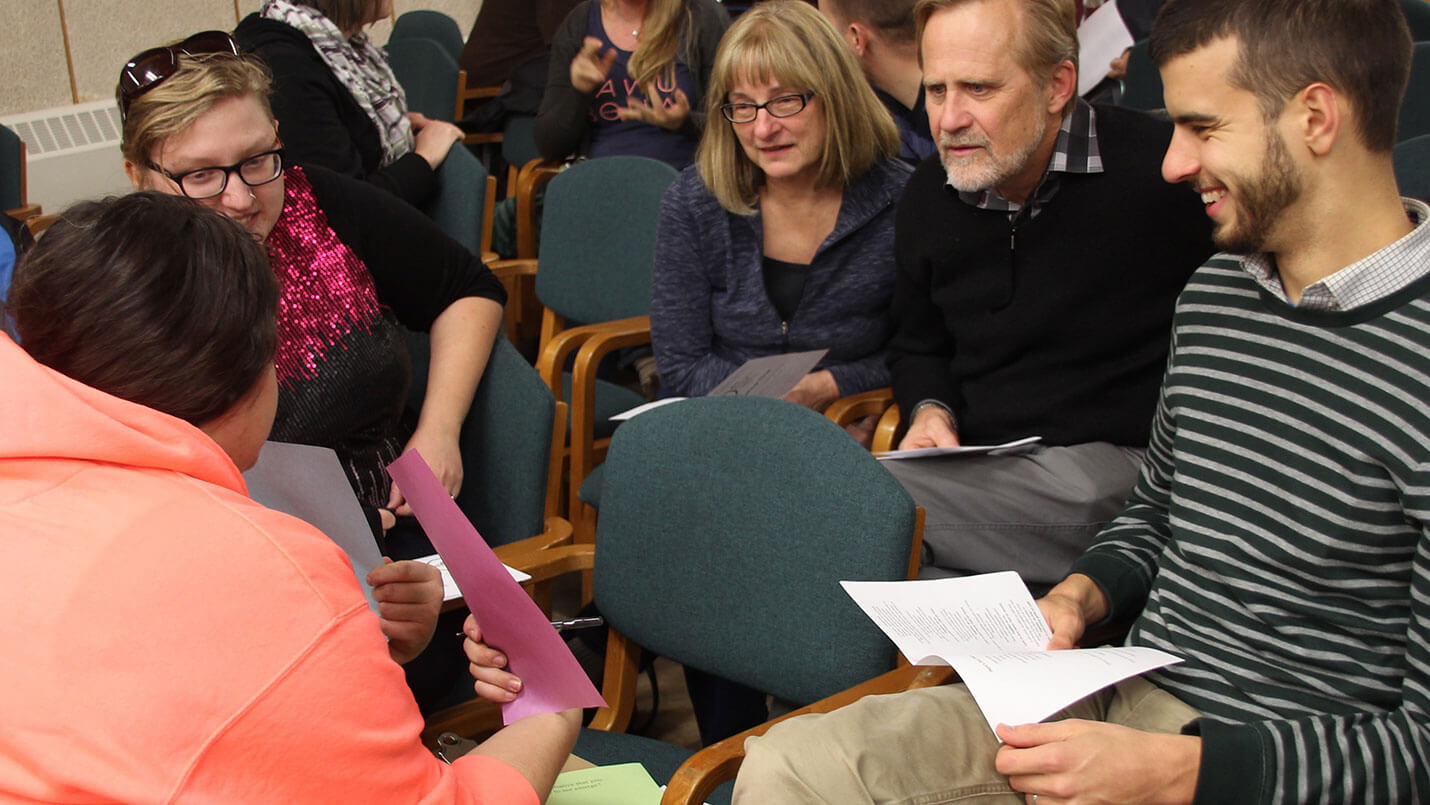


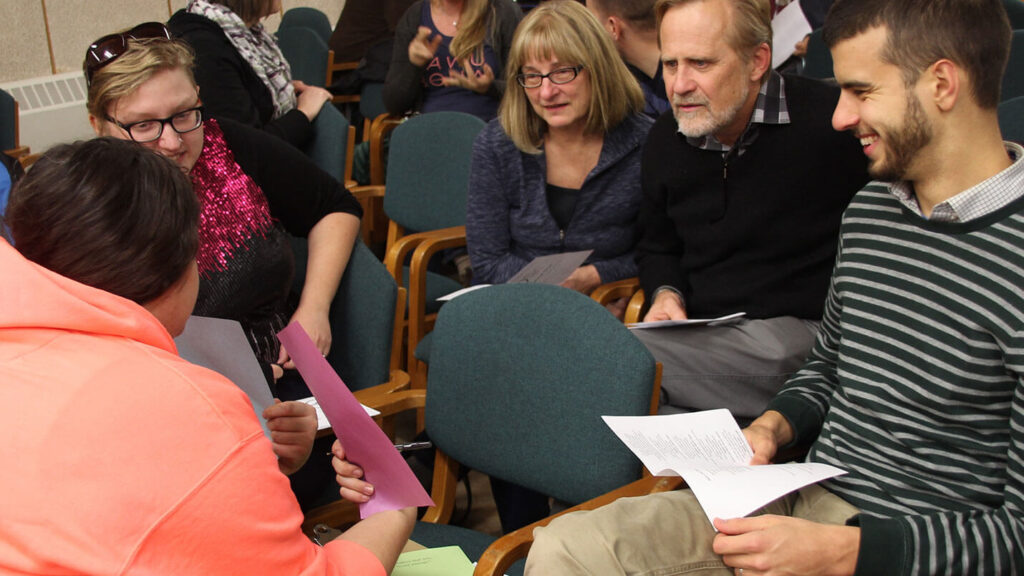
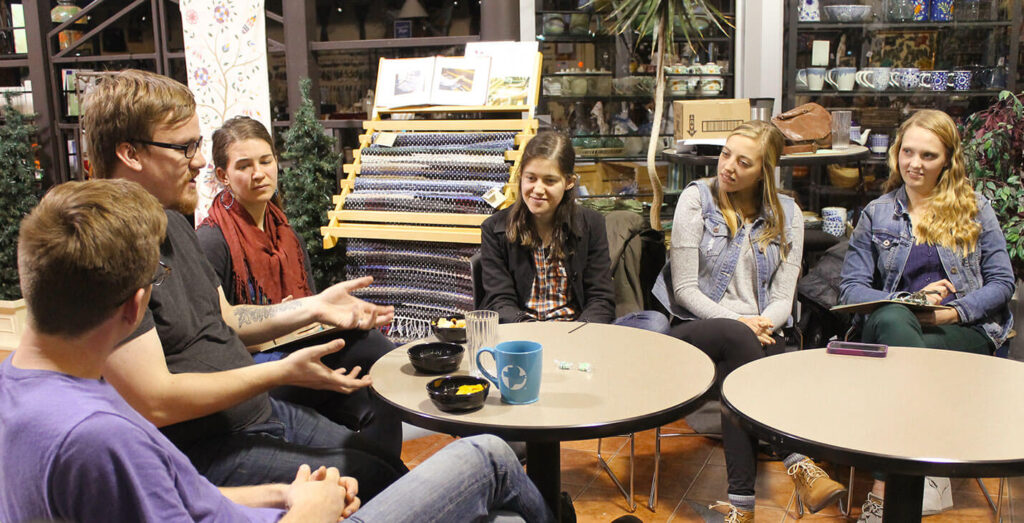
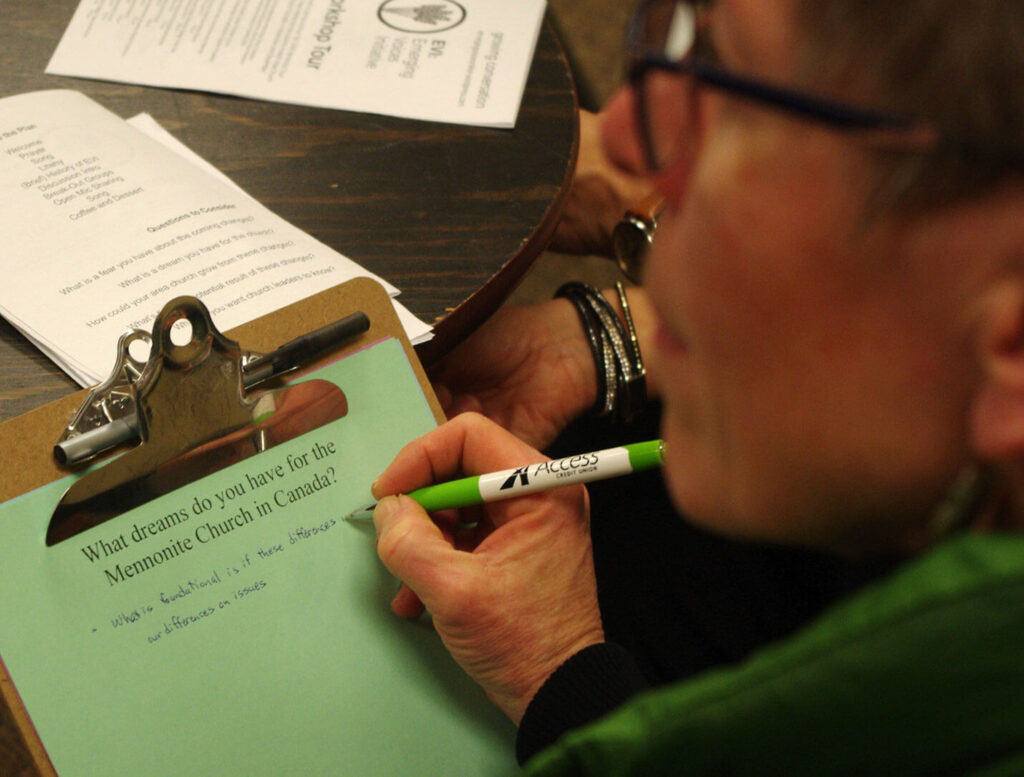
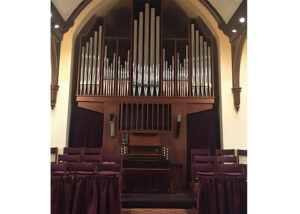


Leave a Reply
You must be logged in to post a comment.